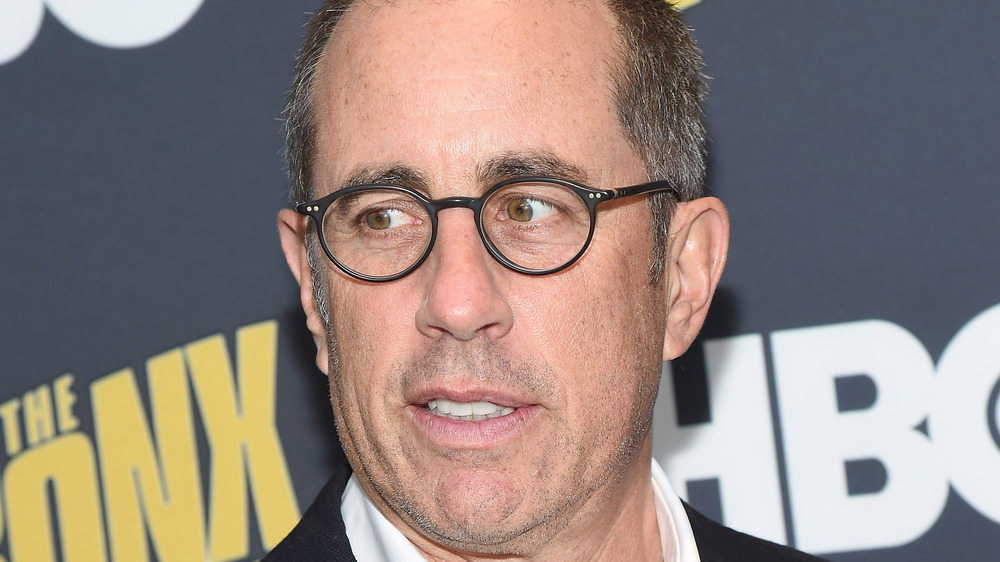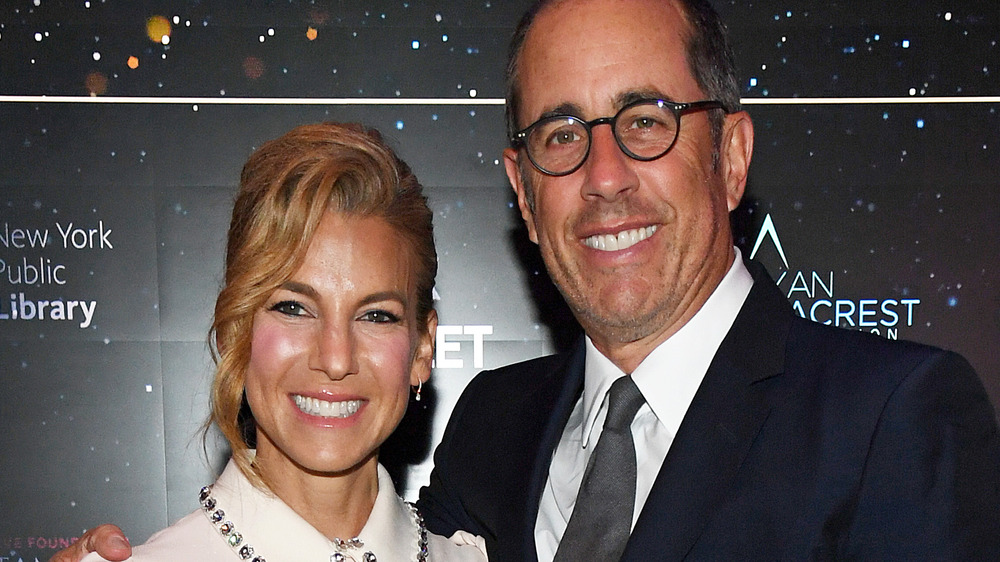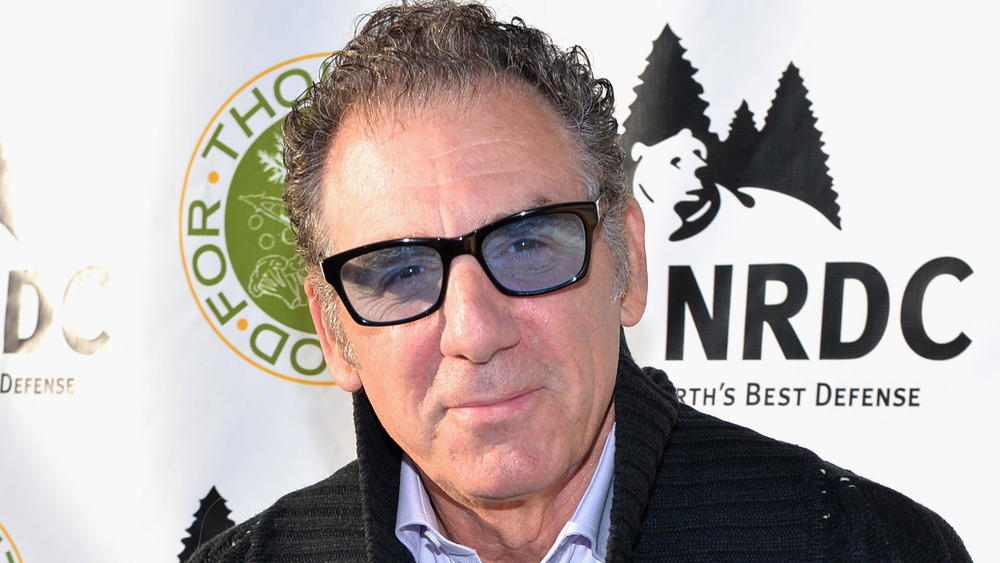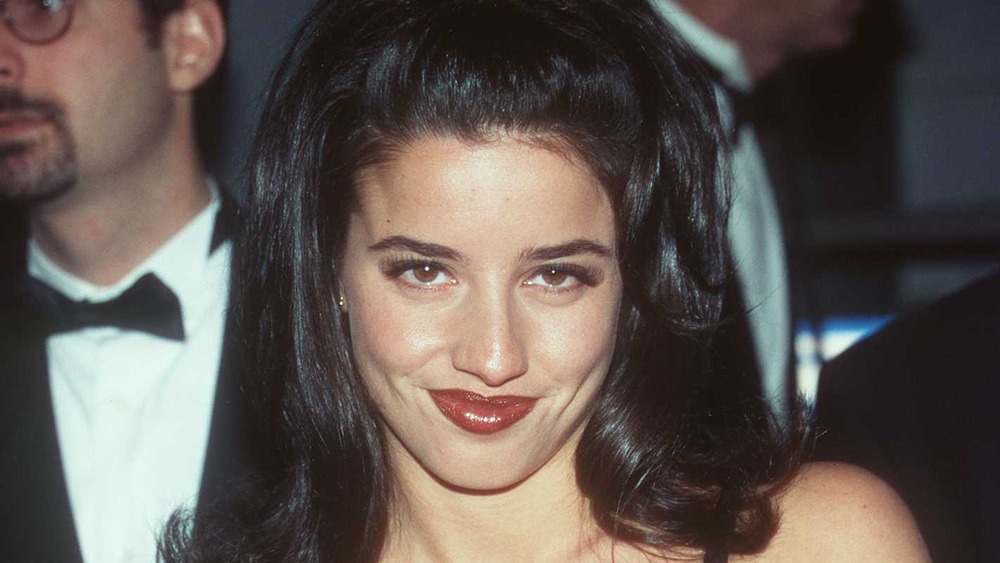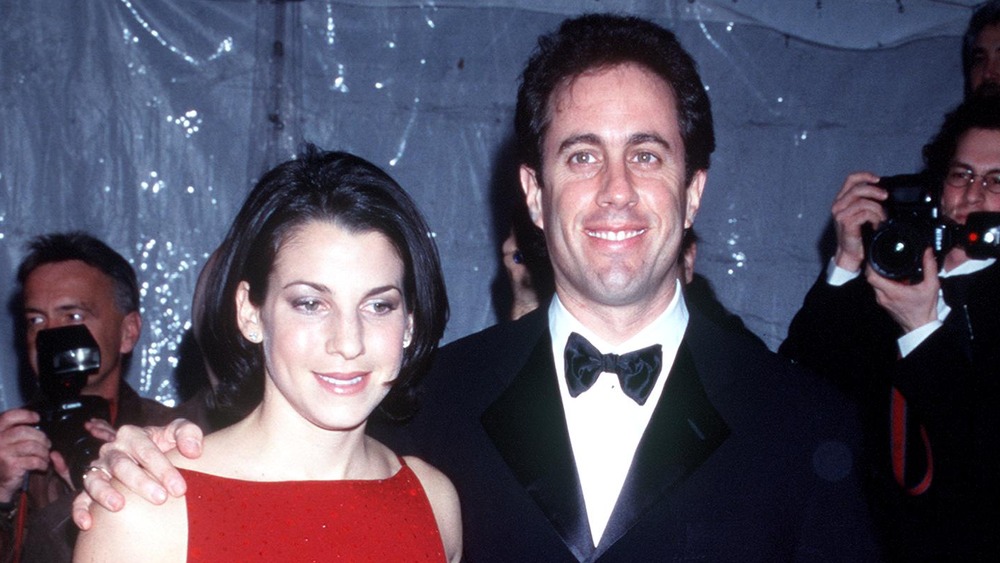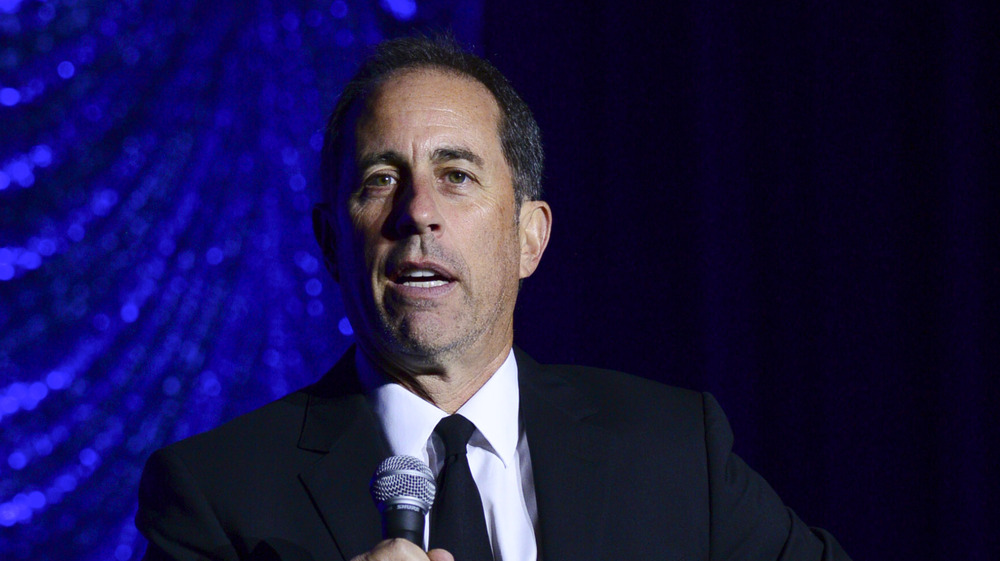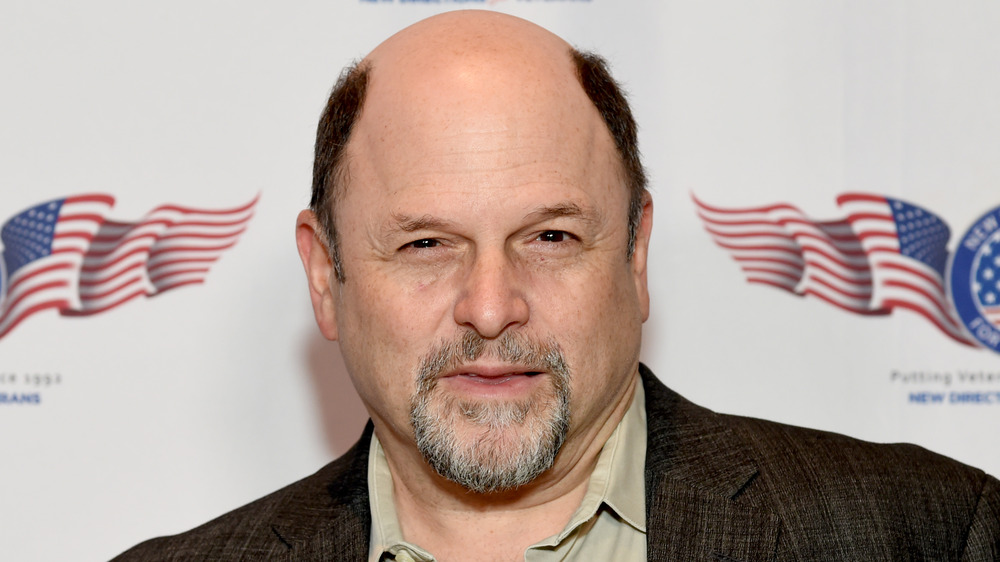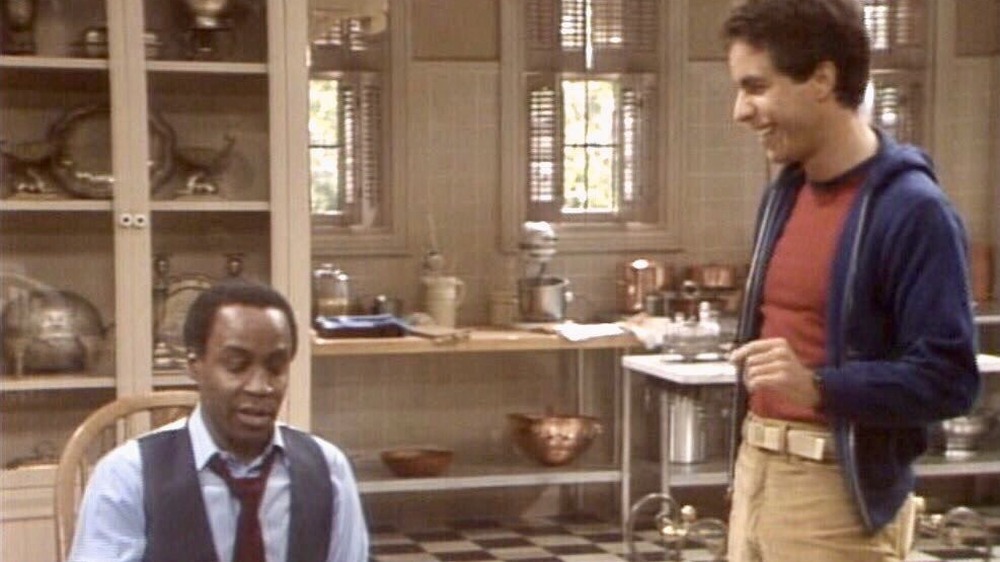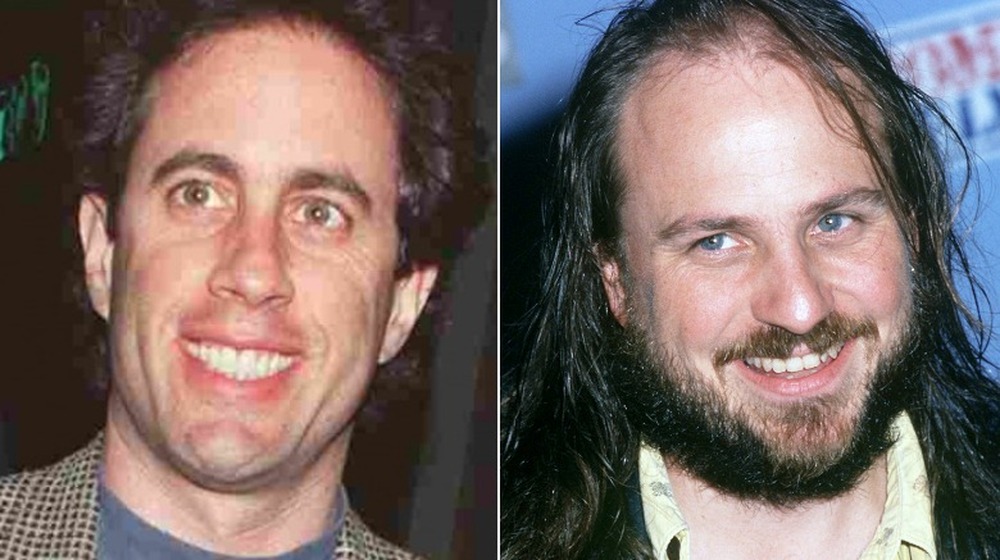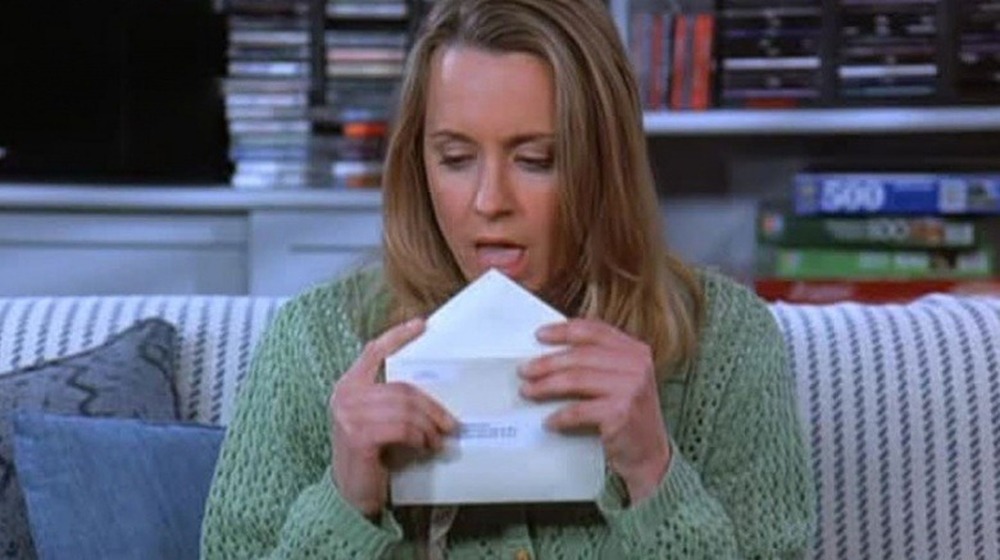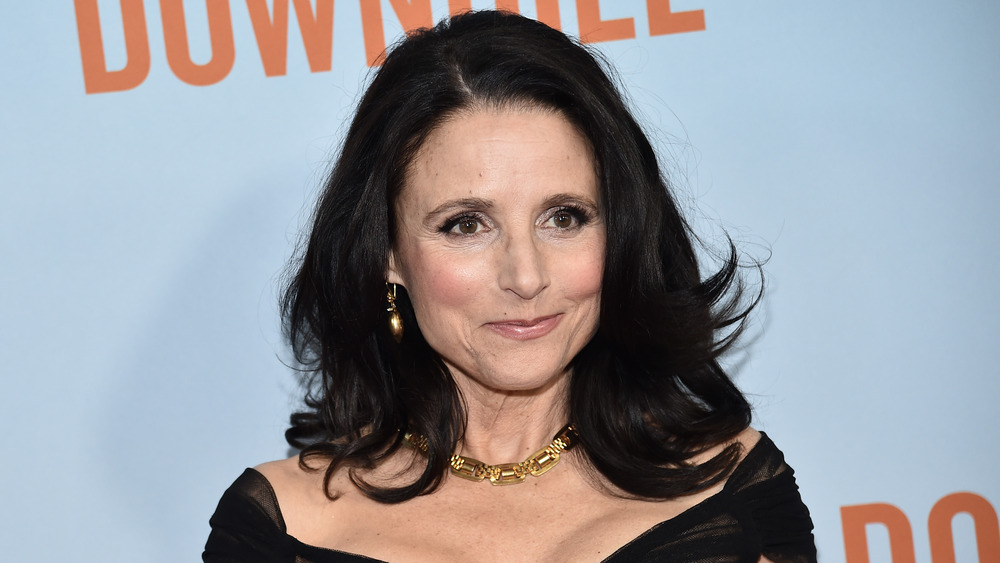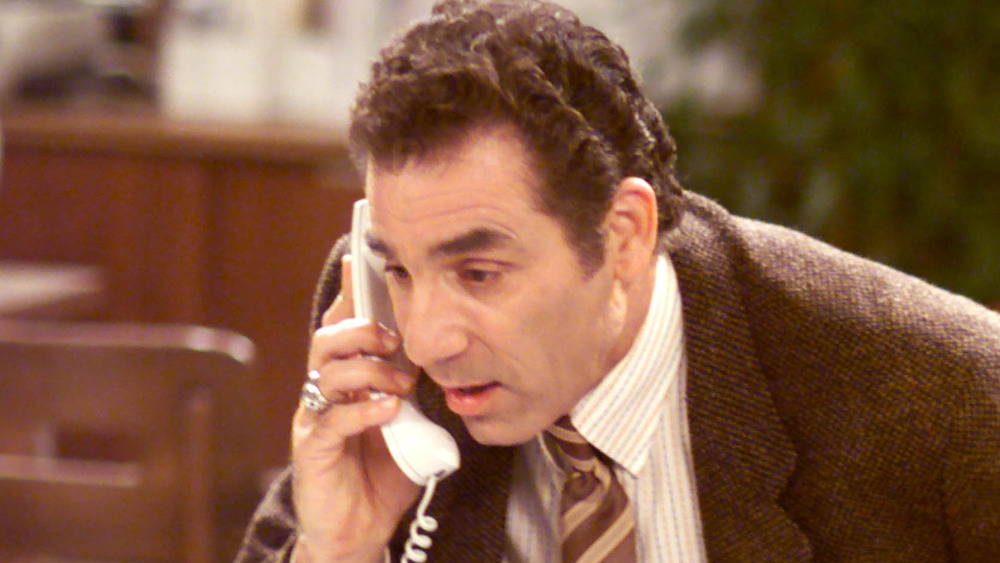Scandals That Haunt The Cast Of Seinfeld
A monster hit for most of its 1989 to 1998 run, Seinfeld ushered in a new era of sophisticated TV comedy, served as the central show around which NBC built its successful "Must See TV" lineup, and made its primary cast members extremely wealthy with their per-episode salaries, residual payments, and endorsement deals.
Being on a hit TV series, or more accurately, the most popular show on television and definitive '90s comedy, also significantly raised the profile of star and co-creator Jerry Seinfeld (Jerry), Julia Louis-Dreyfus (Elaine), Jason Alexander (George), and Michael Richards (Kramer). Seinfeld made the previously successful performers into mega-celebrities and household names, and their activities and thoughts soon became public knowledge and of great mass interest. But with that comes wide reporting of their misbehavior, bad decisions, and controversial actions, many of which were hard for these actors to shake off and leave behind.
Here are the most scandalous things the cast of Seinfeld ever did.
Jerry Seinfeld was involved in a plagiarism suit
In the fall of 2007, Jessica Seinfeld, wife of Jerry Seinfeld and mother of some kids with the comedian, published Deceptively Delicious: Simple Secrets to Get Your Kids Eating Good Food. It was a cookbook with a powerful angle: her numerous recipes for child-friendly fare packed extra vitamins and nutrition because they all secretly contained flavor-masked fruit and vegetable purees. The book shot to the top of The New York Times bestseller list, but in January 2008, per Reuters, Jessica was targeted in a lawsuit from another cookbook author, Missy Chase Lapine, who alleged that Deceptively Delicious "brazenly plagiarized" from her similarly named, vegetable-smuggling cookbook, The Sneaky Chef.
Jerry got himself involved in the affair when he appeared on The Late Show with David Letterman and teased Lapine and her filing, earning himself charges of defamation from The Sneaky Chef author. (The comedian had called the author a "crackpot" and likened her to an assassin.) However, both Seinfelds were eventually cleared of wrongdoing.
In 2010, according to CNN, the 2nd U.S. Circuit Court of Appeals in New York ruled in Jessica's favor, noting that "stockpiling vegetable purees for covert use in children's food is an idea that cannot be copyrighted." Meanwhile, the defamation suit was thrown out of court after a judge ruled that it would have been "inconceivable that a reasonable viewer would have believed that Seinfeld's statements [on The Late Show with David Letterman] were conveying facts about Lapine."
The night Michael Richards destroyed his career with some racist language
After his time on Seinfeld ended, Michael Richards put character acting on hold for a while in order to return to stand-up comedy, which he'd explored with some moderate success back in the 1970s. In November 2006, Richards booked a plum gig to perform at the West Hollywood comedy club The Laugh Factory, one of the most famous and influential of such establishments in the country during the 20th century stand-up boom. Now, there are comedians "bombing" on stage, and then there's what Richards did on the night in question — he essentially blew up his career in just a few minutes.
Kyle Doss, an African-American man, was in attendance that night, and he told TMZ that he "playfully" heckled Richards during his comedy routine. Rather than ignore or gently tease Doss back, Richards came undone, unleashing a stream of profane, racially-charged, and racial epithet-laced vitriol. To paraphrase, Richards told Doss that in another era of history, he could have brutally attacked the man for speaking out of turn. Richards then used the N-word five times in under three minutes — all of it caught on video.
Richards later apologized (via satellite) on The Late Show with David Letterman, but the professional damage was done. Since the incident, Richards has acted on five occasions, including Jerry Seinfeld's Bee Movie and as "himself" on Larry David's Curb Your Enthusiasm.
Adult Jerry Seinfeld dated a teenager
In May 1993, according to People (via Gawker) Jerry Seinfeld was out and about in New York City's Central Park when a young woman caught his eye, and he asked for her phone number. That young woman whom the 38-year-old comedian and sitcom star found so attractive: 17-year-old Shoshanna Lonstein. When grilled by radio host Howard Stern about the budding relationship with someone 21 years his junior — and who was still in high school when they met — Seinfeld explained that Lonstein was "the only girl I ever went out with who was that young. I wasn't dating her. We just went to a restaurant, and that was it."
That may be true, but the relationship quickly got more serious. Later in 1993, Seinfeld made trips to visit Lonstein at George Washington University, and Lonstein took frequent weekend trips to Los Angeles, where Seinfeld lived while Seinfeld taped. Lonstein told Details (via the Associated Press) that she transferred to UCLA to be closer to Seinfeld, but that they finally split up in 1997. According to Lonstein, she "wanted to run around and play," while Seinfeld seemingly "worked 24 hours a day, seven days a week."
Jerry Seinfeld wooed his wife right after she married another guy
In late 1999, according to ET, 45-year-old Jerry Seinfeld married 28-year-old Jessica Sklar, a Tommy Hilfiger publicist he met in August 1998 after noticing her in a Reebok Sports Club gym on the Upper West Side of Manhattan (per Yahoo!Lifestyle). Sklar was in a bit of a complicated situation, and the resultant and scandalous love triangle enthralled New York gossip column writers.
According to The New York Times, Sklar was already married when she met Seinfeld, and a newlywed at that — she'd gotten hitched to prominent theater producer Eric Nederlander just two months previously. But that relationship was already on the rocks before Sklar went ahead with the wedding. Weeks before she met Seinfeld, she'd started to move out of the apartment she shared with Nederlander.
Nevertheless, it wasn't a good look for Seinfeld, who was painted in the press as a celebrity swooping in and stealing a woman away from a less famous man. As Nederlander later claimed to Page Six (via the New York Post), "I was manipulated, misled and completely caught off guard by Jessica's infidelity. Jerry and Jessica have no respect for decent values. They deserve each other. I'm going on with my life."
Jerry Seinfeld resents PC culture
Years after Michael Richards' obscene rant, Jerry Seinfeld came under fire for what could be called dismissive comments about race and gender in comedy, a world in which he's a giant and influential figure. "This really pisses me off," Seinfeld declared on CBS This Morning in 2014 when asked about the criticism that his streaming talk show, Comedians in Cars Getting Coffee, featured a preponderance of white comedians. "People think [comedy] is the census or something, it's gotta represent the actual pie chart of America. Who cares?" Later, he added, "Funny is the world that I live in. You're funny, I'm interested," and that he has "no interest in gender or race or anything like that."
Seinfeld's comments were later criticized by a number of major publications, ranging from Time to the Independent. But in 2015, he doubled-down on his remarks. On the radio show, The Herd (via Vulture), he recalled an exchange with his teenage daughter, in which she labeled something as "sexist." He went on to claim, "They just want to use these words. 'That's racist. That's sexist. That's prejudice.' They don't know what the [expletive] they're talking about." Yikes.
Jason Alexander upset many in the LGBTQ+ community
The English language is a constantly changing thing. Phrases that might have been socially acceptable at one time may become offensive as the general public grows more sensitive and socially conscientious. Take for example the word "gay." Today, it's an innocuous word interchangeable with "homosexual." Back in the '80s, according to NPR, it also meant homosexual, but because LGBTQ+ people weren't widely accepted, gay also meant "very bad" or "lame" or "not manly enough." And in 2012, ex-Seinfeld star Jason Alexander used "gay" in that fashion.
In an interview on The Late Late Show with Craig Ferguson, host and guest discussed the sport of cricket. "You know how I know it's really kind of a gay game? It's the pitch," Alexander said (via The Hollywood Reporter). "It's not like a manly baseball pitch; it's a queer British gay pitch." In the wake of criticism and backlash, Alexander apologized. "I should know better," he said in a statement. "My daily life is filled with gay men and women, both socially and professionally. I am profoundly aware of the challenges these friends of mine face and I have openly advocated on their behalf. So, I can only apologize and I do. In comedy, timing is everything."
Jerry Seinfeld was fired from his first TV gig
It's always a little embarrassing to get fired from a job, regardless of the circumstances or even the position. It happens to the best and the worst of us — and in 1979, it happened to Jerry Seinfeld, one of the hottest rising stand-up comedians in America at the time. It's even more wince-inducing 40 years after the fact, because of the workplace that callously terminated Seinfeld years before he'd co-create and star in one of the most popular sitcoms of all time.
The comedian-actor was unceremoniously dismissed from his role on the broad and silly ABC comedy series, Benson, a spinoff of the provocative Soap, in which smart aleck butler Benson Dubois (Robert Guillaume) goes on to perform the same job for a governor. In three 1980 episodes, Seinfeld played Frankie, a courier who fancied himself a stand-up comedian who would launch into his routines at inopportune times. Per The New York Times, Seinfeld and the show's producers couldn't get on the same page about how Frankie should be played. They ultimately agreed to disagree, and the Benson producers got rid of Seinfeld.
But as Seinfeld claimed in 2006 (via Sitcoms Online), "They didn't bother to tell me," until after he showed up for rehearsal. "I was angry," he continued. "That doesn't happen in stand-up. Once you get to a certain level, they don't make you go back to the beginning." The experience led Seinfeld to put all his effort into his comedy career, saying, "Because I can control that."
Jerry Seinfeld has a sort-of-secret rivalry with Bobcat Goldthwait
Actor and comic cabaret performer Bridget Everett appeared as a guest on Jerry Seinfeld's Comedians in Cars Getting Coffee in 2019, and the conversation turned to mutual friends in the comedy world. "You know I'm good friends with," Everett said, with the name of the comedian covered over with a bleep — for good reason, it would seem.
"I don't like him. At all," Seinfeld revealed, cutting off Everett's story. "... I had kind of forgotten about him. And then there was a little article about him in the paper. And even in that, there was a veiled reference to his dislike of what I did." Seinfeld explained that this comedian publicly derided more traditional comedians (like Seinfeld) because "they weren't as wild and dangerous as he was. 'Cause he sucked."
Internet sleuths became curious if not desperate to uncover the identity of the comedian whom Seinfeld had so brazenly criticized, just because he'd once slammed Seinfeld and his ilk. Josh Sorokach of Decider seemingly figured it out. His research, and clues sent in by readers, pointed to Bobcat Goldthwait, a scream-style comedian popular in the 1980s, who also starred in the Police Academy movies before becoming a notable film and TV director. Not only did he direct Everett's pilot, Love You More, but he also once did an interview with The Spokesman-Review, where he called Seinfeld a "weird" and "creepy" man who dates teenagers.
The cast of Seinfeld got an actor fired from the show
According to The Wall Street Journal, Seinfeld co-creator Larry David wrote the show with a thesis statement in mind: "No hugging, no learning." That made Seinfeld a lot darker and more brutally funny than most other sitcoms of the 1990s — treacly, moral-enriched fare like Growing Pains and Full House. But the show reached new depths in 1996, when it killed off a major character. Susan Ross, played by Heidi Swedberg, was George Costanza's fiancée, even though he didn't seem to like her all that much. He was off the hook of marriage and a single guy again when Susan died after ingesting fatal amounts of glue by licking the inexpensive wedding invitations that George had selected.
The real reason Susan died? Several Seinfeld big shots didn't want to work with Swedberg anymore. "Her instincts for doing a scene, where the comedy was, and mine were always misfiring," Jason Alexander (George) told Howard Stern in 2015 (via The Hollywood Reporter). So, he'd try a different acting strategy to match Swedberg's: "And I'd adjust, and then it would change." Alexander revealed that he confided his frustrations to co-star Julia Louis-Dreyfus, who reportedly remarked, "Don't you wanna just kill her?" When David heard all the negative chatter about Swedberg — namely that the main cast found her "f**king impossible" to work with, he got rid of her by getting rid of Susan.
Alexander quickly apologized to Swedberg when the reveal made headlines, calling her "a kind, lovely person" whom the cast apparently "really liked."
Julia Louis-Dreyfus was uncovered on a cover and looked for cover
For the most part, Julia Louis-Dreyfus' history is squeaky-clean. However, the winner of a whopping eight acting Emmy Awards and Veep star did endure some minor controversy in 2014 over a Rolling Stone cover (via Today) that featured a pretty major faux pas.
In promoting Veep, a comedy about government and politics, Dreyfus appeared in a tastefully nude pose, with the U.S. Constitution seemingly tattooed on her bare back. The problem had less to do with Louis-Dreyfus appearing in the buff and more to do with a glaring error that would have most embarrassed the actor's junior high civics teacher: Her back tattoo featured the distinctively large signature of early American politician John Hancock. But he didn't sign the Constitution — rather, his huge name appears at the bottom of the Declaration of Independence.
Louis-Dreyfus handled the very small scandal with grace and humor. "In my defense, 'I was in a drunken stupor,'" she tweeted. Later, the actor posted a doctored image of herself as a baby bearing the John Hancock signature. "John Hancock not part of tattoo. It is a birthmark," Louis-Dreyfus quipped.
The 'Seinfeld Curse' was real
Seinfeld was such a popular and successful show — the No. 1 show on TV in its final year, and the winner of 10 Emmy Awards — that it was a hard act to follow for its main cast members. But despite raking in a ton of money and accolades from their nine seasons on Seinfeld, actors Jerry Seinfeld, Julia Louis-Dreyfus, Michael Richards, and Jason Alexander all wanted to continue appearing in things — and TV networks were eager to green-light projects starring such beloved stars. The only problem? Audiences didn't seem to care about any of those post-Seinfeld shows starring Seinfeld stars that were not Seinfeld.
Over the years, the embarrassing notion that the performers were under some kind of "Seinfeld Curse" persisted, such was the abysmal failure of their 2000s TV projects. For example: The Michael Richards Show and Alexander's Bob Patterson each lasted nine episodes; Louis-Dreyfus' Watching Ellie made it 17 installments; and Seinfeld's bickering couples game show, The Marriage Ref, faded away after 24 airing. Thankfully, the unofficial curse was unofficially broken when Louis-Dreyfus took on the title role in HBO's Veep — a comedy that won the Emmy for outstanding comedy series three times in its seven-season run.

